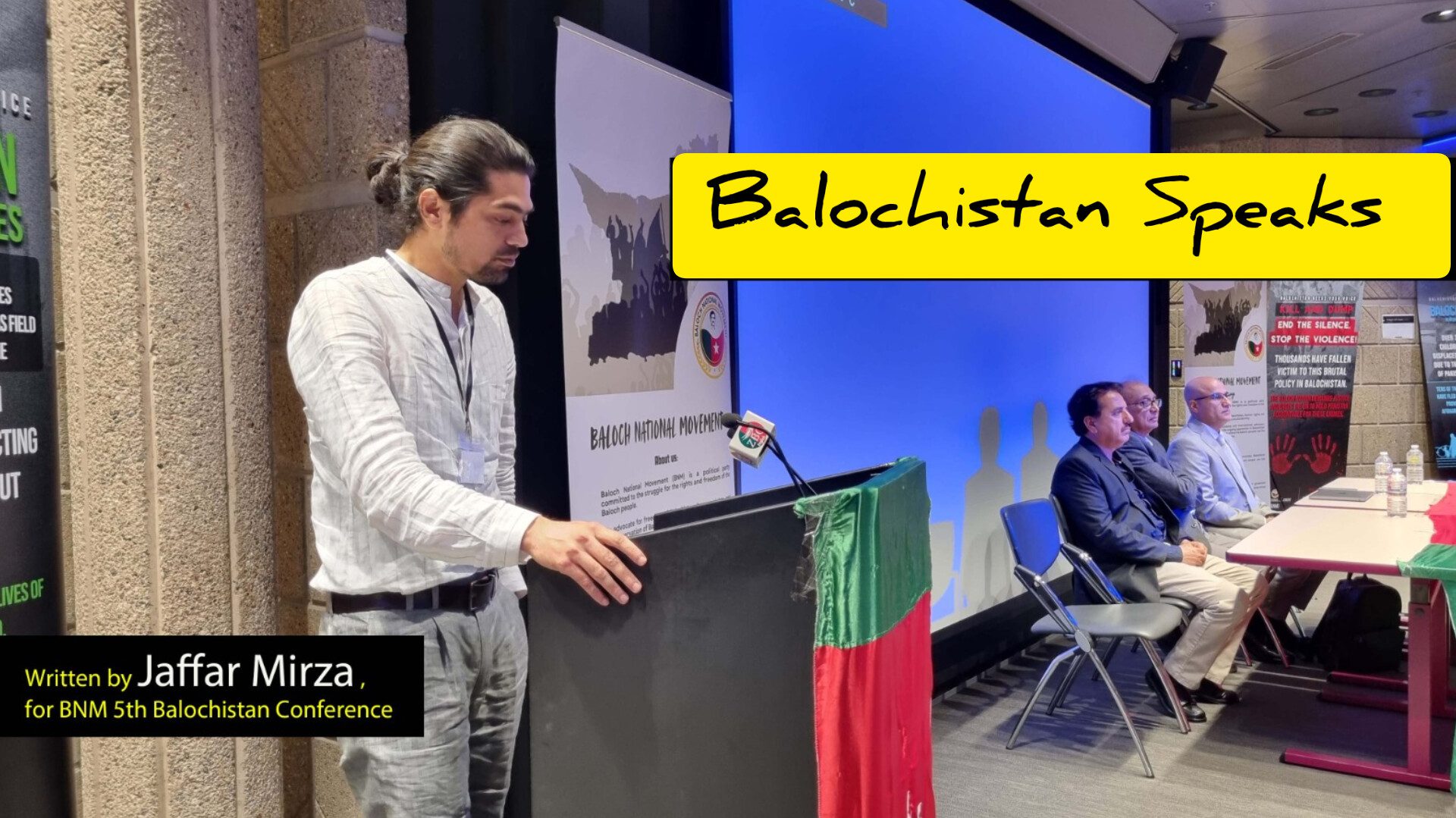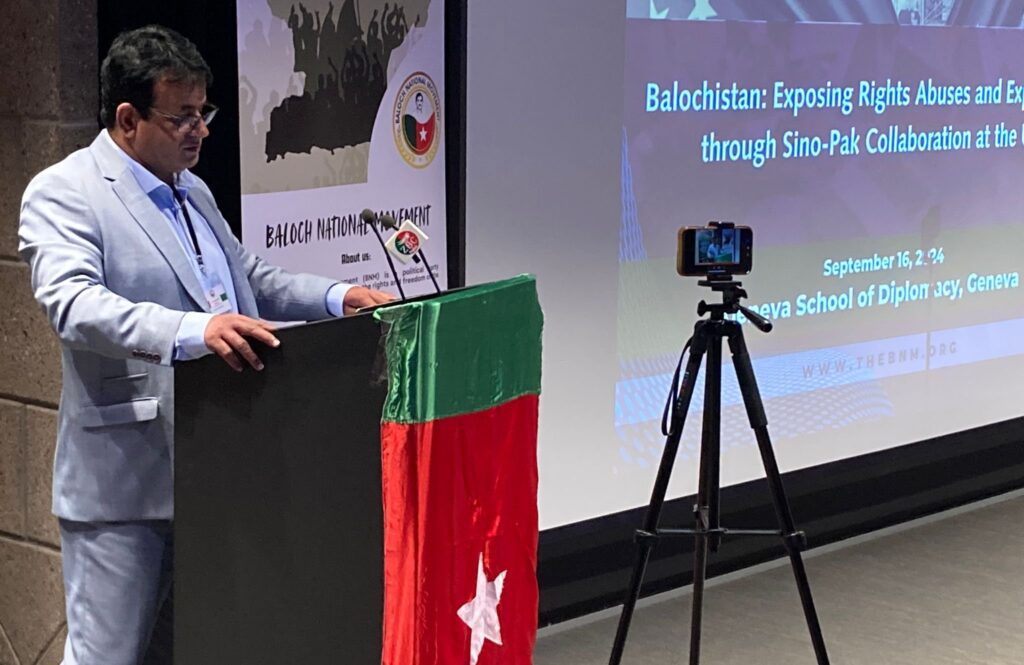I am a researcher focusing on freedom of religion or belief and violence against religious minorities in Pakistan. My PhD centers on Islam in Britain, where I am documenting the post-1945 history of the Shi’a community in the country.
I believe most people in this room are already familiar with the human rights violations in Pakistan. Almost all ethnic groups have been victims of state violence and repression. Similarly, religious minorities face discrimination and violence on a daily basis. I often wonder and struggle to understand what exactly the Pakistani state aims to achieve. How can a state be so complicit in a situation where every other ethnic and religious group faces persecution and widespread discontent? However, today, I will not focus on religious or ethnic minorities. Instead, I want to focus on the Balochs and Balochistan.
Just a bit of background: I actively began engaging with human rights issues in Balochistan from 2013 onwards. I distinctly remember when the Balochistan issue was treated as peripheral. But it is no longer a peripheral issue. It has become mainstream, with people from all parts of Pakistan not only aware of the military’s role in Balochistan but also expressing sympathy with Balochistan’s cause. The people in this room and those following online are well-informed about Balochistan, so my role today is merely as an observer. I will share my reflections on how, over the last 10 years, the Balochistan movement has emerged as a powerful force.
I agree that the recent events led by various Baloch groups represent an uprising of diverse movements. Some have called it the “Baloch Spring.” From non-violent, human rights-based struggles to militancy, the strength we now see in the overall Baloch struggle is unprecedented. The collective consciousness among the Balochs, and how it is expressed publicly, is something we haven’t seen before.
One thing that has made me reflect is why the Baloch movement has become so powerful that it is gaining not just local but international attention. Some might say this is not the first Baloch uprising—this could be their fourth or fifth. However, the current uprising and its impact differ from those in the past, making this movement deserving of deeper analysis. Since I have limited time, I will focus on two interconnected reasons that make the current movement different, powerful, and unique.
First, the democratization of information and narrative formation. In the past, the Pakistani state-controlled and manipulated narratives surrounding human rights violations and the Baloch question. The state blamed external elements and Baloch tribal leaders for all the issues in the region. However, social media has challenged the state’s monopoly over the narrative and information. The Pakistani army, like traditional armies, has used violence to suppress the legitimate concerns of the people. But physical violence no longer guarantees control over the narrative. Social media has brought the Balochistan issue into the spotlight. Abductions, killings, and other repressive actions can no longer hide human rights violations. Modern states, including Pakistan, are no longer the gatekeepers of information. For example, the Israeli army, despite its technological sophistication, cannot fully conceal the mass killings and humanitarian crises in Palestine.
The second point I want to make is the cross-generational and cross-gender participation in the current movement, which has had a significant impact. Although the involvement of young Balochs and women is not new, the Baloch Student Organisation (BSO) has historically been a movement for young students, and women like Karima Baloch and Farzana Majeed have been active since the early 2000s. In fact, it is the leadership of women like the late Shaheed Karima Baloch that has inspired young Baloch women to join the current movement. When Karima was leading, very few women publicly represented the cause. Her leadership inspired a new generation of women, who were teenagers during her active years, and have now grown up seeing her mobilize Baloch families. As a result, young women and girls are now leading and becoming the face of the movement. The charisma of figures like Mahrang, Sammi, and other Baloch women is so powerful that they have already inspired future generations of Balochs both within Balochistan and in the diaspora.
Yesterday, I watched a clip shared by a Baloch friend, in which a child, barely 7 or 8 years old, named Fatima Baloch, gave a speech at a protest in Quetta. She clearly articulated who oppressed her nation, abducted her loved ones, and humiliated her family members. She vowed that those who humiliated her nation would themselves face humiliation, referring to the military. This level of clarity in one so young is rare, yet it is a common sight in Balochistan because the younger generation has witnessed the brutal, repressive responses of the Pakistani state, politicizing them from a very young age.
As I mentioned earlier, the diaspora plays a significant role. Recent protests in London, organized by BNM, have seen an increase in the presence of women and young girls, a phenomenon that can be attributed to the “Mahrang effect.” In a way, this is a global consciousness or uprising that has united different Baloch groups and ensured cross-gender participation, something we haven’t seen on this scale before.
Returning to the point about cross-generational involvement, the younger generation, particularly Gen Z and millennials, are more tech-savvy, which gives them a greater awareness of how to shape and challenge mainstream narratives. The Baloch Yakjehti Committee is a prime example of how the Balochistan issue is being framed from a global, anti-colonial perspective. While this anti-colonial framing is not new—Baloch literature has long presented the issue through this lens—the current generation’s timing and execution are remarkable. The use of terms such as “dispossession,” “occupation,” “exploitation,” and “climate justice,” and how the young generation aligns these terms with global anti-colonial movements, has made the Baloch struggle part of a global discourse.
This alignment has garnered solidarity from figures like Greta Thunberg and other anti-colonial movements. Credit goes to young Balochs for connecting their struggle with global movements, turning the human rights violations in Balochistan into an international issue. This recognition beyond South Asia is one of the greatest achievements the younger generation has brought to the movement.
In conclusion, the key question remains: where do the Baloch movement and the Pakistani Federation go from here? Most of us in this room are aware of the crisis Pakistan is currently facing, and many commentators believe that the federation is on the verge of collapse. Some even suggest that the belief in the “idea of Pakistan” is now largely confined to Sindh and Punjab. A recent BBC report claimed that Balochistan is no longer under Pakistan’s grip.
I am not an expert on armed insurgencies, so I cannot say whether the reinvigorated Baloch insurgency poses an existential threat to Pakistan. However, what is becoming clearer is the growing consciousness among the Balochs regarding self-determination and doubts about their future within Pakistan.
I am not claiming that every person in Balochistan seeks independence. I am neither Baloch nor do I live there, so I will leave that to the people of Balochistan. However, one thing is certain: every person in Balochistan desires freedom, justice, and dignity—things they have been deprived of for the last 70-plus years.
Pakistan cannot continue denying these fundamental rights to the Balochs. Suppressing their voices has never worked and will not work in the future. If history teaches us anything, it is that state persecution only makes the Balochs more resilient.
I will end with a piece of Urdu poetry as a reminder to the Pakistani state: those who thought that by killing Karima Baloch they could silence the Balochs did not realize that dozens of Karimas had already been born in Balochistan:
ki raat jab kisī ḳhurshīd ko shahīd kare to subah ik nayā sūraj tarāsh laatī hai.
This does not translate literally, but contextually it means that no matter the scale of violence and oppression, the Balochs will rise again every day.



